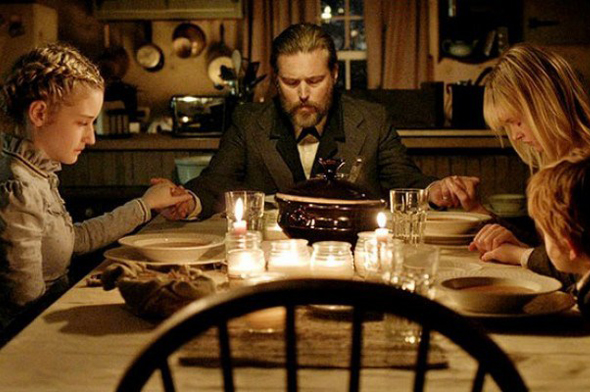http://www.youtube.com/watch?v=KXKogr0O-Zc
We Are What We Are can cause discomfort right from its title, and for a horror film that is a good thing. The word “we†suggests a direct statement from the characters involved in the story. It can even be interpreted as a message to the audience by the filmmakers. Whoever is saying “we are what we are†is clearly implying the dominance of fate over free will. There is no control, there is no choice, there is no changing ourselves — we are what we are. It is a terrifying thought in and of itself, particularly when applied to people who participate in unsavory activities.
The fate vs. free will concept is strong in this film, especially since religion plays such a strong part. The religion in question is a cult-like belief structure that has apparently been upheld for years by the Parker family. On the outside, they seem like a pious and generous, albeit eccentric and isolated, family. They are held in generally good esteem by their neighbors and fellow townsfolk, who have no idea that a crucial rite in the Parker religion involves consuming human flesh.
Following the sudden death of the Parker mother, Frank Parker (Bill Sage) is suddenly left alone with his teenage daughters, Iris (Ambyr Childers) and Rose (Julia Garner), as well as his young son Rory (Jack Gore). It is clear from the start that the girls are uncomfortable with their religion’s customs. They hope that their mother’s death will bring about an end to the practices, but they realize with growing horror that they must continue to feed the family in the manner that befits their tradition. Meanwhile, a major storm is unearthing more and more evidence of the Parker clan’s culinary habits. This catches the eye of the local doctor (Michael Parks), whose own daughter is among a growing number of missing persons.
The Parker religion is not explicitly explained beyond a few whispered prayers and some stories read by one of the daughters, both of which weave beautifully with the onscreen drama, but the religion itself isn’t important. What is underlying everything here is the danger of growing up in an extreme fundamentalist environment. This type of environment can take on a number of different appearances, and indeed We Are What We Are looks quite different from the Mexican film it remade, Somos lo que hay.

A solid dark horror film in its own right, Jorge Michel Grau’s Somos lo que hay told a similar story with some very different reasons behind the actions. What writer/director Jim Mickle and writer Nick Damici have done with their American remake is go beyond recreating the story for a subtitle-phobic audience (Let Me In, anyone?), completely repurposed some character storylines, swapped genders of characters in ways that make the story work better, and added personal motivations for the characters in a way that says something new, perhaps even more clearly, than in the original. We Are What We Are is a rare example of a remake surpassing the film that inspired it.
With the deluge of insipid remakes coming out of Hollywood, it is interesting to see such an exemplary specimen come from a very independent production. The script moves the story forward with utmost care, supplying enough momentum to remain engaging but never yielding to what could easily become a brainless shocker. All characters have a life and humanity that feel very real, with no small thanks owed to excellent performances all around — especially from the child actors.
We Are What We Are dares to explore darkness while attempting to do more than what’s typically expected from a horror film. The ideas at play are frightening and at times shocking, but they are never over the top or cheap. The evil acts in the film come from genuine feelings of righteousness, from a sincere belief that those acts are beyond the control of free will, and that can be the scariest thing of all.
We Are What We Are is screening for one night only on Saturday, February 15 at the Digital Gym Cinema. Seating is extremely limited. (Full disclosure: reviewer Miguel Rodriguez is one of the programmers for the Film Geeks screenings at the Digital Gym Cinema. He gets paid nothing for that job — in fact, he gets negative dollars — instead donating his time to bring films to San Diego that would otherwise get the shaft.)
